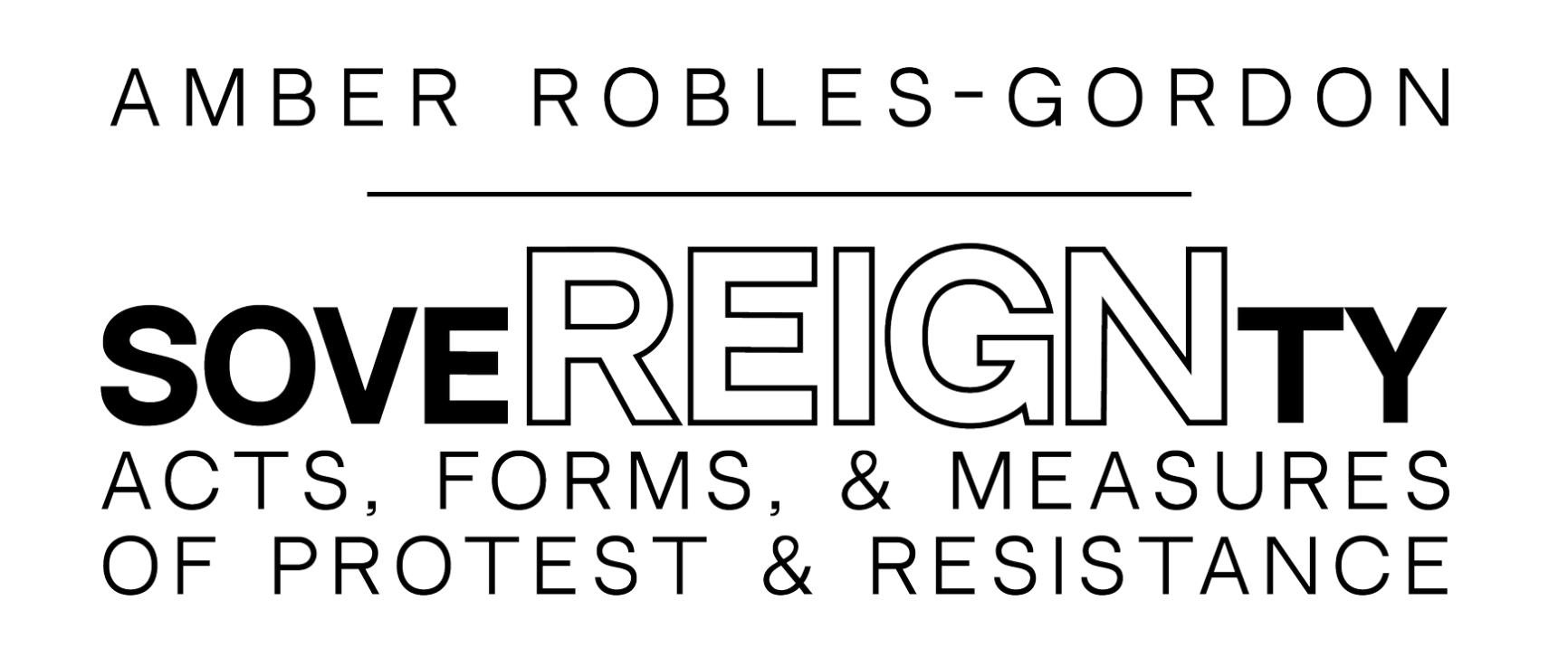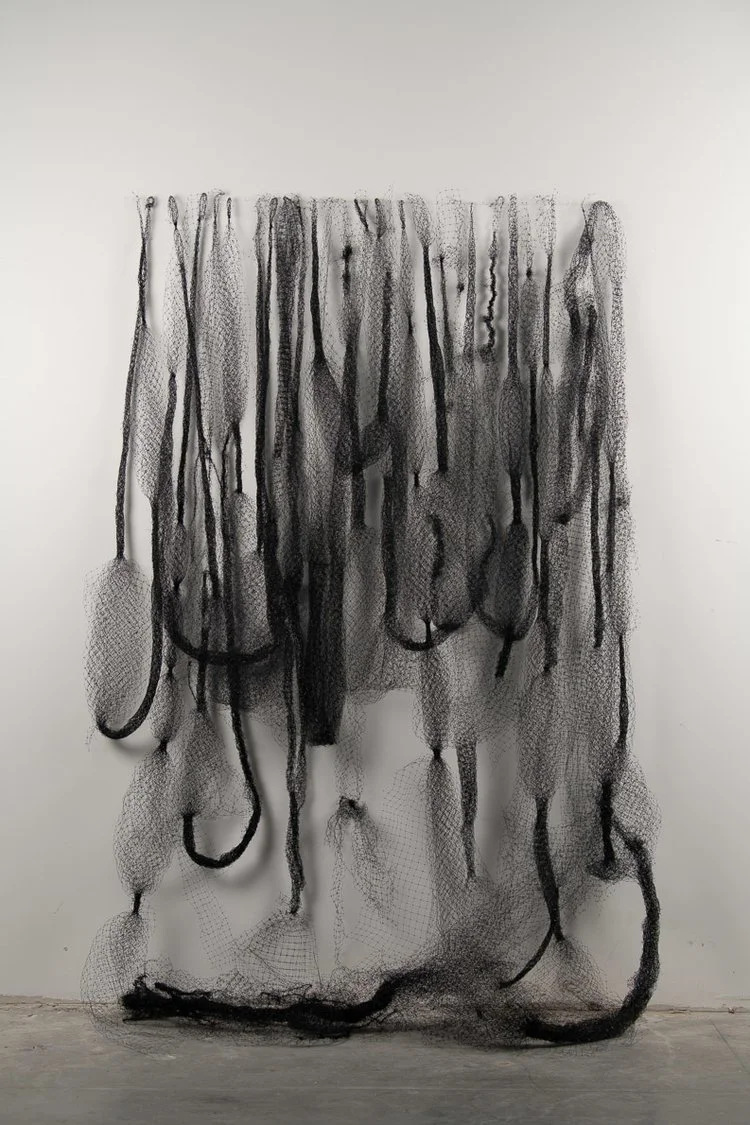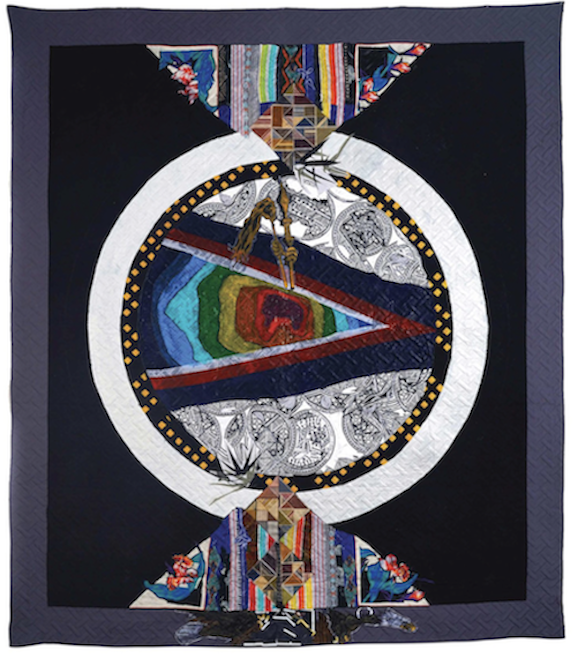This exhibition features Amber Robles-Gordon’s large-scale, mixed-media quilts–assemblages incorporating paint, textiles and hand-stitching–in an interrogation of U.S. policy towards–and governance of–its populated territories and the District of Columbia.
Read Moreexhibit
Millenium Arts Salon & AU Museum: A Conversation between Amber Robles-Gordon & Dr. Tuliza Fleming

On November 13, 2021 the Millennium Arts Salon provided a salon talk featuring Artist Amber Robles-Gordon in an interview with Interim Chief Curator of the National Museum of African American History and Culture, Dr. Tuliza Fleming, at the American University Museum.
Black Portraitures VII
marking territory in the void
Date: February 17, 2022
Time: 2:00 pm—3:30 pm
Location: Paul Robeson Gallery Workshop B
Speakers
Sarah Stefana Smith – Mount Holyoke College
Moderator
Alex Callendar
This panel is devised around the work of Carribeanist scholars and thinkers, Edouard Glissant and Sylvia Wynter. Both articulate a desire to conceive of other worlds through a reconsideration of diasporic time, space and territory, and the opacities of history. Or, as artists we ask through their theoretical frames; how do you mark a territory to something that is a void, or an abyss, or unspeakable, or mistaken as a thing? Through studio practices, which include mixed-media, drawing, time-based works and performance, we consider in an open sense, historical recovery as sites of intervention, provisionality, and play, holding space for the language of transparency and opacity emergent in Black aesthetics.
The roundtable puts to use this year’s convening of Black Portraiture and the capaciousness of play. Play then, to use the words of Stuart Hall, becomes a mode to consider Black diaspora being, refusal and resistance with no guarantee. Hall notes on play with no guarantee,
“Far from being eternally fixed in some essentialized past, they are subject to the continuous “play” of history, culture and power. Far from being grounded in mere “recovery” of the past, which is waiting to be found, and which when found, will secure our sense of ourselves into eternity, identities are the names we give to the different ways we are positioned by, and position ourselves within, the narratives of the past” (Hall 2000, 23).
Thus, we conceive of this roundtable on play with no guarantee in manifold ways. Some negotiate historical counternarratives through the afterlife of the archive, while others meditate on materiality and matter as psychic scaffolding and memory work.
Bios
Alex Callender’s practice uses methods of drawing, painting, and installation to trace and remap historical materials as a means to explore with both criticality and care, how we might disentangle the interwoven relations of race, gender, and capitalism. Callender is an Assistant Professor of Art at Smith College.
Amber Robles-Gordon, is a mixed media visual artist. Her creations are visual representations of her hybridism: a fusion of her gender, ethnicity, cultural, and social experiences. Known for recontextualizing non-traditional materials, her assemblages, sculptures, installations emphasize the essentialness of spirituality and temporality within life. Robles-Gordon, received a Bachelor of Science, Business Administration from Trinity University, and a MFA from Howard University.
Nyugen E. Smith (USA, Haiti, Trinidad and Tobago) is a first-generation Caribbean-American interdisciplinary artist based in Jersey City, NJ. Through performance, found object sculpture, mixed media drawing, painting, video, photo and writing, Nyugen deepens his knowledge of historical and present-day conditions of Black African descendants in the diaspora. He holds a BA, Fine Art from Seton Hall University and an MFA from The School of the Art Institute of Chicago.
Sarah Stefana Smith is an interdisciplinary scholar and visual artist. Their sculpture and installation work explores the intersection of repair and disrepair. Their research communicates between the fields of Black art and culture, queer theory and affect studies, visuality and aesthetics. Smith is an Assistant Professor of Gender Studies at Mount Holyoke College.
https://www.blackportraitures.info/bp7/event/marking-territory-in-the-void/
Derek Eller Gallery Presents a Solo Exhibition of Mixed-Media Works by Amber Robles-Gordon
Derek Eller Gallery is pleased to present a solo exhibition of mixed media works on canvas by Amber Robles-Gordon. With an array of materials including acrylic paint, fabric, beads, magazine images, photographs, and ink drawings, Robles-Gordon assembles patchwork compositions which interweave her personal narrative within the fraught political, socioeconomic, and environmental threads that define the colonialist relationship between the United States and Puerto Rico.
Read MoreMuseums Review In the galleries: Artist’s works criss-cross the paths of U.S. colonialism
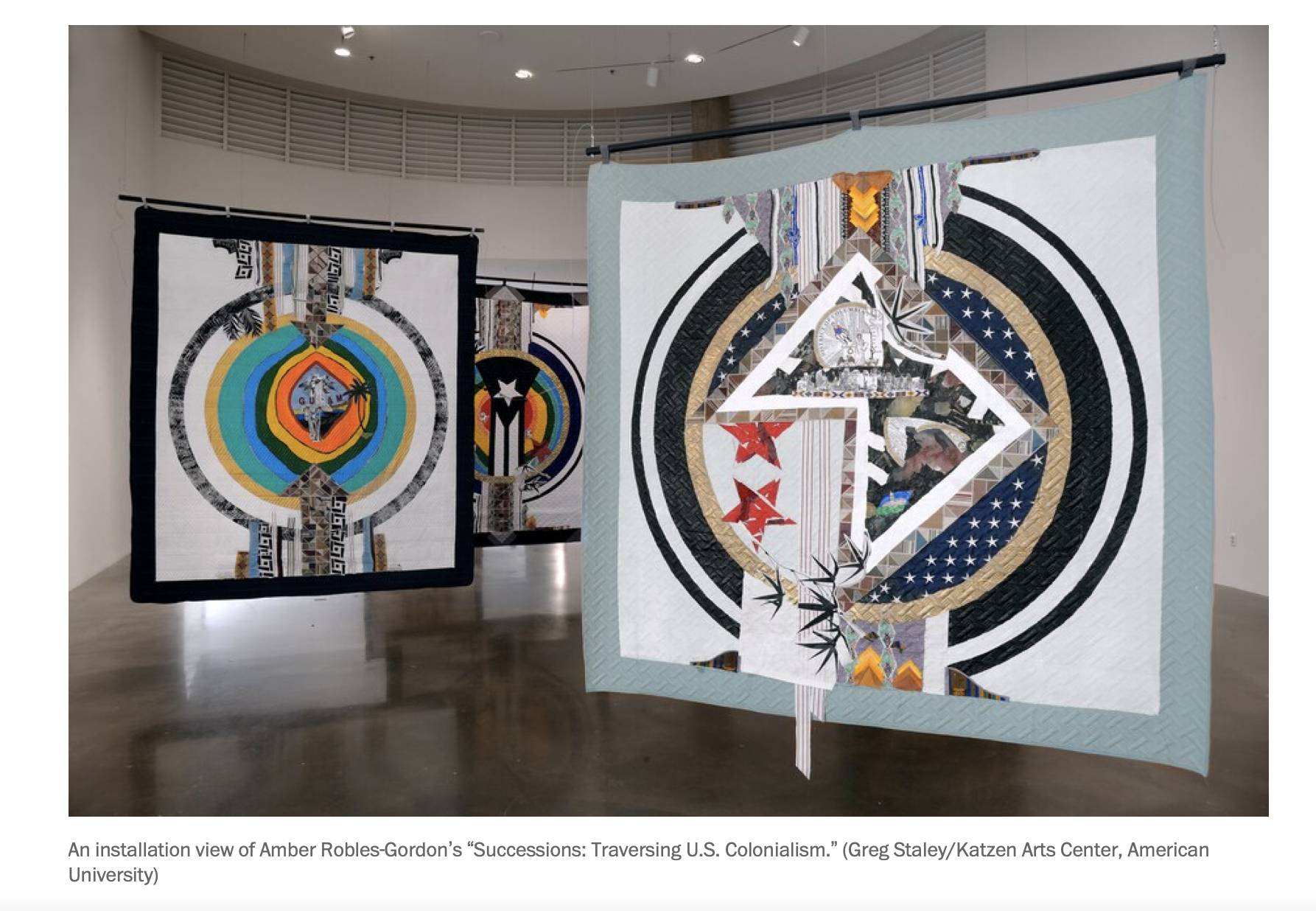
Residents of D.C. are used to seeing the place as an almost-state, much like Maryland or Wyoming, yet not quite. Amber Robles-Gordon, a longtime Washingtonian who was born in Puerto Rico, has a different take. Her American University Museum show, “Successions: Traversing U.S. Colonialism,” groups D.C. with her birthplace and four other inhabited territories: Guam, the U.S. Virgin Islands, American Samoa and the Northern Mariana Islands. She represents these disenfranchised territories on two-sided quilted banners, one face for “political” and the other for “spiritual.”
Read MoreExamining Black Existentialism through the Curatorial Lens
Join our panelists as they journey through texts by Octavia Butler and bell Hooks, Parable of the Sower and Salvation: Black People and Love. They will explore and discuss parallels and intersections between themes posited in these seminal texts and their own individual curatorial/artistic practices.
Read MoreWeaving Identity: A Conversation on Textile Practice in the 21 st Century
This panel explores the power of contemporary visual art through the practices of the Diaspora’s most preeminent artists who innovate through the use of textiles. The panel will also share how their works are impacted by black existential thought. Followed by Cocktails and Light Bites Vranken Pommery and Red Rooster.
Read MoreSuccessions: Traversing US Colonialism Listed on BmoreArt’s Picks: November 2-8
This Week: John Oliver’s hand-picked AVAM exhibition, A Passion for Collecting: The Vision of Louis Allan Ford at Galerie Myrtis, Zoë Charlton in conversation presented by Cade Gallery, Bridget Z. Sullivan at Hamilton Gallery, Jonna McKone/Keep A-Knockin’/Noah Breuer/Solo Lab 5 opening at VisArts, Amber Robles-Gordon at the Katzen Art Center, Katie Pumphrey: Night Swim at Project 1628, The Guardians presented by the Peale at Carroll Mansion, and more … plus Maryland Art Place UNDER $500 2021 and other featured calls for entry.
Read MoreTrinity Talks with Artist Amber Robles-Gordon
Join the Office of Alumnae/i Relations for Trinity Talks with Amber Robles-Gordon ’05, Cultivating Inner Voice, Connective Tissues and Threading Visions, the Artwork of Amber Robles-Gordon on Tuesday, November 16, 2021 at 6:00 pm ET via Zoom.
Join Amber for an artist talk that focuses on following and cultivating a relationship with one’s inner voice and how that has directed her path thus far. She will highlight projects that exemplify this premise and how that lead to her first solo exhibit featured at American University.
Read MoreOf the Place, An American University, MFA Studio Art Program Sponsored Conversation
The MFA Studio Art program at American University is pleased to present
Of the Place, a series of conversations that center the artists, art organizations, art activators, and culture producers who have deep connections to their locale.
The theme reflects the times that we are living in – many of us have had to stay in place over the last year. The global pandemic, politics, and the cultural circumstances of our contemporary world have necessitated a change in our social and work patterns. We are looking within our own communities to share resources and support.
Read MoreGallery Talk: "Successions: Traversing US Colonialism"

C Artist Amber Robles-Gordon talks "Successions: Traversing US Colonialism" with curator Larry Ossei-Mensah. . "Successions" is a conceptual juxtaposition that celebrates abstraction as an art form while leveraging it as a tool to interrogate past and current US policies within its federal district (Washington, DC) and territories (including Guam, Puerto Rico, and the US Virgin Islands) that it controls. . On view through December 12, 2021. Learn more and plan your visit:
https://www.american.edu/cas/museum/2021/successions.cfm
Read MoreAmerican University Museum at the Katzen Arts Center opens fall exhibitions
Successions: Traversing U.S. Colonialism is a solo exhibition by Amber Robles-Gordon, a conceptual juxtaposition celebrating abstraction as an art form. Robles-Gordon interrogates past and current U.S. policies within Washington, D.C. and the territories (Guam, Puerto Rico and the U.S. Virgin Islands) that it controls…
Read MoreFrom California to Chicago, Tennessee to Maine, 15 of Summer’s Best Museum Exhibitions Remain on View This Fall
A BROAD SELECTION of exhibitions opened at art museums throughout the United States over the summer months. A great number of these shows remain on view, some through September, others further into the fall and beyond. Major traveling exhibitions of Bob Thompson, Joseph Yoakum, and Alma Thomas are underway. The first solo museum exhibitions of Caroline Kent and Simphiwe Ndzube are debuting in Chicago and Denver, while the first survey exhibitions of Jamal Cyrus and Jacolby Satterwhite are on view in Houston and Pittsburgh. Jennifer Packer and Cauline Smith have shows, too. In Nashville, a major retrospective of legendary sculptor William Edmondson is being staged, the first such presentation in two decades:
Read MoreGallery Talk for Successions: Traversing US Colonialism
Gallery Talk: "Successions"
DC mixed-media artist Amber Robles-Gordon talks "Successions" with curator Larry Ossei-Mensah.
About this Event:
Successions is a conceptual juxtaposition that celebrates abstraction as an art form while leveraging it as a tool to interrogate past and current US policies within its federal district (Washington, DC) and territories (including Guam, Puerto Rico, and the US Virgin Islands) that it controls.
This event will be held virtually. Please register to receive the Zoom link via email. Learn more about the exhibition.
OrganizerAmerican University Museum At The Katzen Arts Center
Organizer of Gallery Talk: "Successions"
Housed in the dynamic and multidisciplinary Katzen Arts Center, the American University Museum builds its programming on the strengths of a great college and great university. We focus on international art because American University has a global commitment. We show political art because the university is committed to human rights, social justice, and political engagement. We support the artists in our community because the university takes an active and responsible role in the formation of our contemporary art and culture.
We present exhibitions that mirror American University’s aspiration to be the premier Washington-based, global university. Our programming puts the best art of our region in a national and international context. Our collections enable us to present the art history of Washington, while our Kunsthalle attitude brings the most provocative art of our time to our place.
You may also like the following events from American University Museum at the Katzen Arts Center:
Next month, 12th October, 06:00 pm, Gallery Talk: "Seeing Climate Change"
Next month, 14th October, 06:00 pm, Gallery Talk: "Reveal" in Online
This November, 17th November, 06:00 pm, Gallery Talk: “In the Light of Memory” in Online
Also check out other Arts Events in Online,Exhibitions in Online.
Ticket Information: RSVP
Tickets for Gallery Talk: "Successions" can be booked below.
https://www.eventbrite.com/e/gallery-talk-successions-tickets-163405503259
Ticket Price: Free
Image: Amber Robles-Gordon, y mi bandera vuela mas alto que la tuya (detail), 2020. Mixed media collage on canvas, 18 x 24 in. Courtesy of the artist.
Successions: Traversing US Colonialism Amber Robles-Gordon
August 28–December 12, 2021
American University Museum Curated by
at the Katzen Arts Center Larry Ossei-Mensah
Amber Robles-Gordon presents Successions: Traversing US Colonial- ism, a solo exhibition on view at the American University Museum at the Katzen Arts Center in fall 2021. Successions is a conceptual juxta- position that celebrates abstraction as an art form while leveraging it as a tool to interrogate past and current US policies within its federal district (Washington, DC) and territories (including Guam, Puerto Rico, and the US Virgin Islands) that it controls. By highlighting nuances relat- ed to US governance in its federal districts and territories, Robles-Gor- don seeks to question who has access to resources, citizenship, and the right to sovereignty.
y mi bandera vuela mas alto que la tuya., Mixed Media Collage on Canvas, 18 x 24 in., 2020
Robles-Gordon creates artwork imbued with a layered visual language replete with cultural signifiers and abstract gestures. Successions is a celebration of abstraction as an artistic expression. Robles-Gordon uti- lizes iconic artists like Robert Rauschenberg, Alma Thomas, Romare Bearden, and members of the Washington Color School as vivid refer- ence points for her own dynamic use of color, form, and material within the works she created for the exhibition. These explorations will provide insights into a number of inquiries that undergird the construction of the exhibition. Successions creates a pathway towards discursive crit- icism around issues impacting marginalized communities oppressed by the United States’ hegemonic domestic and foreign policies. The exhibition features a new body of colorful abstract paintings, collages, and quilts created in 2020 and 2021 between San Juan, Puerto Rico (Robles-Gordon’s birthplace) and Washington, DC (where she current- ly lives).
USVI Political, Detail, Front, Mixed Media on Quilt, 86 in. x 90 in., in., 2021
During the height of the COVID-19 pandemic, Robles-Gordon’s creative strategies were directly impacted as a result of sheltering in place in San Juan. The lack of access to materials and arduous circumstances she was confronted with in Puerto Rico and upon returning to Washington, DC catalyzed Robles-Gordon to impro- vise her approach to making works for the exhibition. Moreover, the ex- perience heightened her awareness of how communities on the margin are adversely treated during mo- ments of crisis.
Robles-Gordon’s also uses works featured in Successions to mine the stories, personal narratives, and aesthetics of the women of the Caribbean, particularly of African de- scent, in an effort to investigate the political, socio-economic, and envi- ronmental implications of placemaking, contemporary colonial policy, and notions of citizenship on these social groups. The debate over DC statehood, similar to Puerto Rico, has been a prevalent point of con- tention in the District but rarely featured in the national conversation. Robles-Gordon seeks to use her “backyard” as a metaphor that would
expand our understanding of notions of freedom, liberty, and justice.
A fully illustrated catalog with essays by Ossei-Mensah and Noel Anderson and in-person and virtual programs will accompany the exhibi- tion, enriching the viewer’s experience.
Successions: Traversing US Colonialism @ American University Museum at the Katzen Arts Center
Amber Robles-Gordon
Curated by Larry Ossei-Mensah
August 29–December 12, 2021
DC Political, Welcome to the District of Colonialism, Front, Mixed Media on Quilt, 86 (L) in. x 90 (H) in., 2021
Amber Robles-Gordon presents Successions: Traversing US Colonialism, a solo exhibition on view at the American University Museum at the Katzen Arts Center in fall 2021. Successions is a conceptual juxtaposition that celebrates abstraction as an art form while leveraging it as a tool to interrogate past and current US policies within its federal district (Washington, DC) and territories (including Guam, Puerto Rico, and the US Virgin Islands) that it controls. By highlighting nuances related to US governance in its federal districts and territories, Robles-Gordon seeks to question who has access to resources, citizenship, and the right to sovereignty.
Robles-Gordon creates artwork imbued with a layered visual language replete with cultural signifiers and abstract gestures. Successions is a celebration of abstraction as an artistic expression. Robles-Gordon utilizes iconic artists like Robert Rauschenberg, Alma Thomas, Romare Bearden, and members of the Washington Color School as vivid reference points for her own dynamic use of color, form, and material within the works she created for the exhibition. These explorations will provide insights into a number of inquiries that undergird the construction of the exhibition. Successions creates a pathway towards discursive criticism around issues impacting marginalized communities oppressed by the United States’ hegemonic domestic and foreign policies. The exhibition features a new body of colorful abstract paintings, collages, and quilts created in 2020 and 2021 between San Juan, Puerto Rico (Robles-Gordon’s birthplace) and Washington, DC (where she currently lives).
During the height of the COVID-19 pandemic, Robles-Gordon’s creative strategies were directly impacted as a result of sheltering in place in San Juan. The lack of access to materials and arduous circumstances she was confronted with in Puerto Rico and upon returning to Washington, DC catalyzed Robles-Gordon to improvise her approach to making works for the exhibition. Moreover, the experience heightened her awareness of how communities on the margin are adversely treated during moments of crisis.
y mi bandera vuela mas alto que la tuya, 2020. Mixed media collage on canvas, 18 x 24 in. Courtesy of the artist.
Robles-Gordon’s also uses works featured in Successions to mine the stories, personal narratives, and aesthetics of the women of the Caribbean, particularly of African descent in an effort to investigate the political, socio-economic, and environmental implications of placemaking, contemporary colonial policy, and notions of citizenship on these social groups. The debate over DC statehood, similar to Puerto Rico, has been a prevalent point of contention in the District but rarely featured in the national conversation. Robles-Gordon seeks to use her “backyard” as a metaphor that would expand our understanding of notions of freedom, liberty, and justice.
Reflexiones sobre el yo, la virgen maría y el colonialismo, (Reflections of Self, The Virgin Mary and Colonialism,) Mixed media, collage on canvas, 18 x 24 in. Courtesy of the artist.
A fully illustrated catalog with essays by Ossei-Mensah and Noel Anderson and in-person and virtual programs will accompany the exhibition, enriching the viewer’s experience.
Click the link below for additional information and artwork included in the exhibition.
https://www.american.edu/cas/museum/2021/successions.cfm
About the Artist:
Amber Robles-Gordon is a mixed media visual artist of Puerto Rican and West Indian heritage. She is known for her commissioned temporary and permanent public art installations for numerous government agencies, institutions, universities, and art fairs.
Robles-Gordon has over twenty years of experience exhibiting and in art education, commissioned critiques, lectures, teaching, and exhibition coordination. She received a BS in business administration from Trinity University and an MFA in painting from Howard University, Washington, DC. She has exhibited nationally and internationally, including Germany, Italy, Malaysia, England, and Spain. Robles-Gordon has participated in residencies in Costa Rica, Washington, DC, and at the American Academy in Rome, Italy. Her artwork has been reviewed and featured in numerous magazines, journals, newspapers, and online publications.
Most recently, she held an online solo exhibition at Galeria de Arte, Universidad del Sagrado Corazón, San Juan, Puerto Rico, and was featured by Tafeta Gallery in the 1-54 Contemporary African Art Fair in London, England, and during London Art Week. In 2022, she will create a traveling exhibition in collaboration with Cultural DC and El Cuadrado Gris Galeria in Puerto Rico.
About the Curator:
Larry Ossei-Mensah uses contemporary art as a vehicle to redefine how we see ourselves and the world around us. A Ghanaian-American curator and cultural critic, Ossei-Mensah has organized exhibitions and programs at commercial and nonprofit spaces around the globe from New York City to Rome, featuring artists including Firelei Baez, Allison Janae Hamilton, Brendan Fernades, Ebony G. Patterson, Modou Dieng, Glenn Kaino, Joiri Minaya and Stanley Whitney. Moreover, Ossei-Mensah has actively documented cultural happenings featuring the most dynamic visual artists working today, including Derrick Adams, Mickalene Thomas, Njideka Akunyili Crosby, Federico Solmi, and Kehinde Wiley.
A native of The Bronx, Ossei-Mensah is also the co-founder of ARTNOIR, a 501(c)(3) and global collective of culturalists who design multimodal experiences aimed to engage this generation’s dynamic and diverse creative class. ARTNOIR endeavors to celebrate the artistry and creativity of Black and Brown artists around the world via virtual and in-person experiences. Ossei-Mensah was a contributor to the first-ever Ghanaian Pavilion for the 2019 Venice Biennial with an essay on the work of visual artist Lynette Yiadom-Boakye.
Ossei-Mensah is the former Susanne Feld Hilberry Senior Curator at MOCAD in Detroit and currently serves as Curator-at-Large at Brooklyn Academy of Music (BAM), where he curated the New York Times heralded exhibition Let Free Ring and A Return: Liberation as Power respectively.
Ossei-Mensah has been profiled in publications including the New York Times, Artsy, and Cultured Magazine, and was recently named to Artnet’s 2020 Innovator List. Follow him on Instagram at @larryosseimensah and Twitter at @youngglobal.
Art in Embassies Program: 3 Questions Digital Series with Amber Robles-Gordon →
An interview from Art in Embassies 3 Questions Digital Series with Amber Robles-Gordon, who speaks about her creative process and artwork at the U.S. Ambassador’s residence in Abuja, Nigeria.
Read MoreAmber Robles-Gordon discusses her series "The Temples of My Familiars
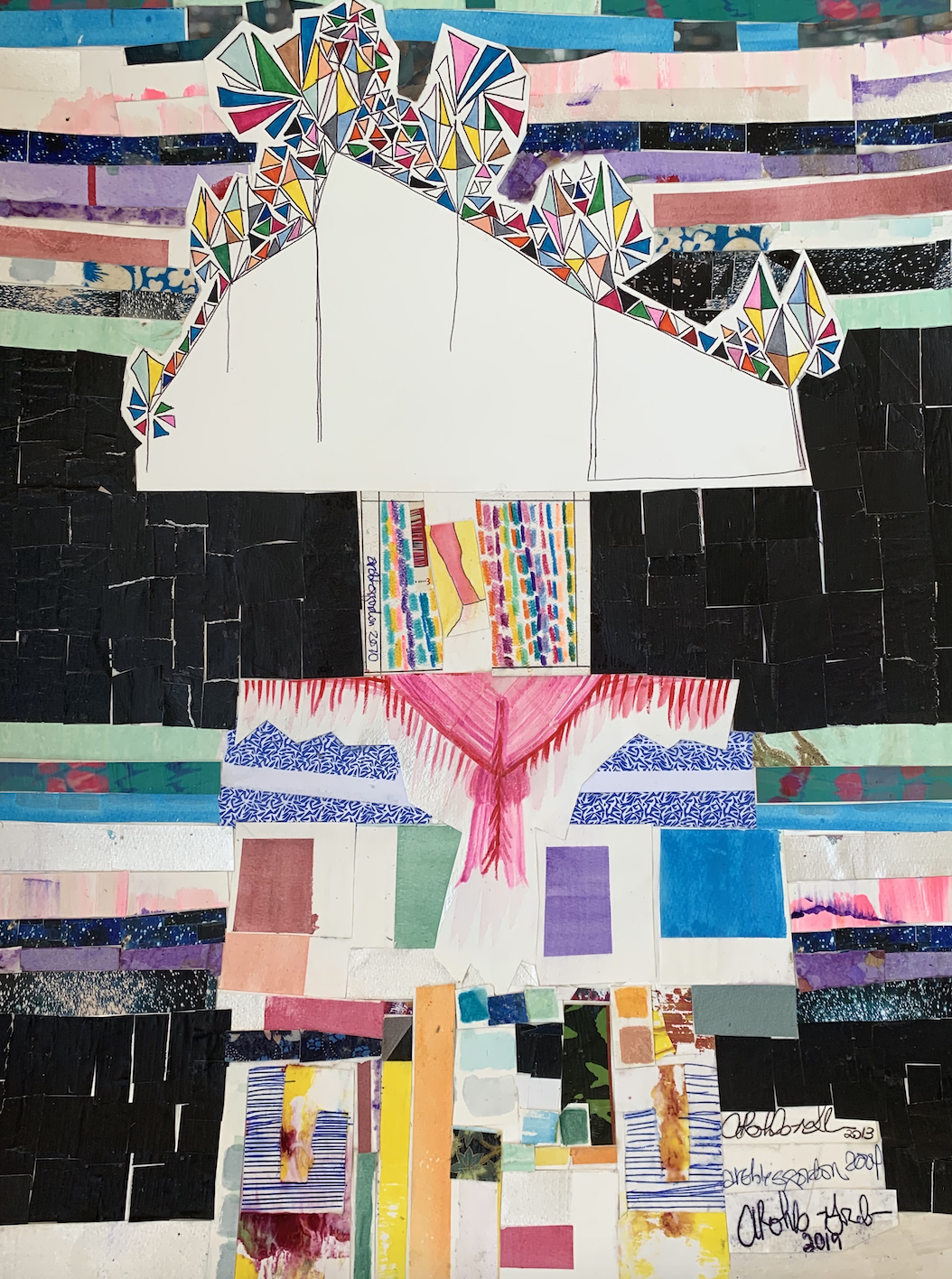
"The Temples of My Familiars" series is about the intersections between my identity, the diverse visual languages in my artwork and the narratives they reference. I chose the title because of the distinct visual reference my sculptural geometric-like renderings took on once I inverted them. They became temples, a place of spiritual practice and sacrifice in which I could place my familiars —my visual languages. A place where they could be re-rooted, re-formulated, and take on a new life.
